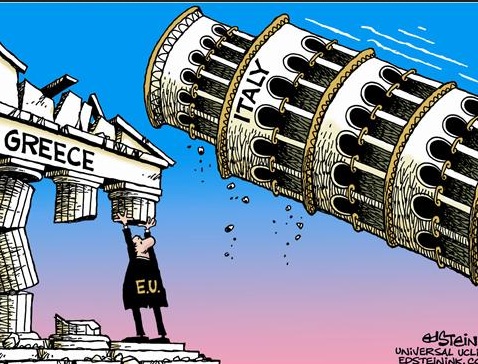Mark Gilbert writes, Italy, a founding member of the euro project and one of the Group of Seven industrialized nations, is slipping so deeply into debt, its credit rating is just one downgrade away from junk. At the same time, the country’s borrowing costs are the lowest they’ve ever been. This contradiction highlights the conundrum the European Central Bank faces as it tries to revive the moribund euro economy.
Standard & Poor’s cut its assessment of Italy’s creditworthiness late on Friday. “Italy’s weak real and nominal economic prospects have undermined public debt dynamics,” the rating company said. S&P expects the Italian economy to expand by just 0.2 percent next year, down from a previous estimate of 1.1 percent. By the end of 2017, the country will owe more than 2.25 trillion euros ($2.77 trillion), about 127 percent of gross domestic product.
It’s not that Italy isn’t trying. Prime Minister Matteo Renzi is forcing labor market reforms that make it cheaper for companies to hire workers and easier for them to fire underperformers. He’s also freezing wages in the public sector.
But in an environment where inflation is almost absent while private-sector wages are still rising, Italy’s competitiveness against its euro peers is slipping. Its membership in the common currency, meantime, rules out a currency devaluation to boost export growth.
It’s the kind of situation you might expect bond vigilantes to exploit for profit, driving yields higher to force yet more government action. With ECB government bond purchases seeming ever more likely, however, those financial-market sanctions won’t happen.
The more the ECB intervenes, the less pressure there is on euro-region governments — particularly Germany. With the central bank bearing the burden of rejuvenating the economy, Germany can continue to berate its neighbors for fiscal negligence and ignore the clear and present danger of deflation. Germany needs to relax on both fiscal flexibility and inflation to bail out its more indebted peers, rewarding them for progress made and helping them grow faster.

